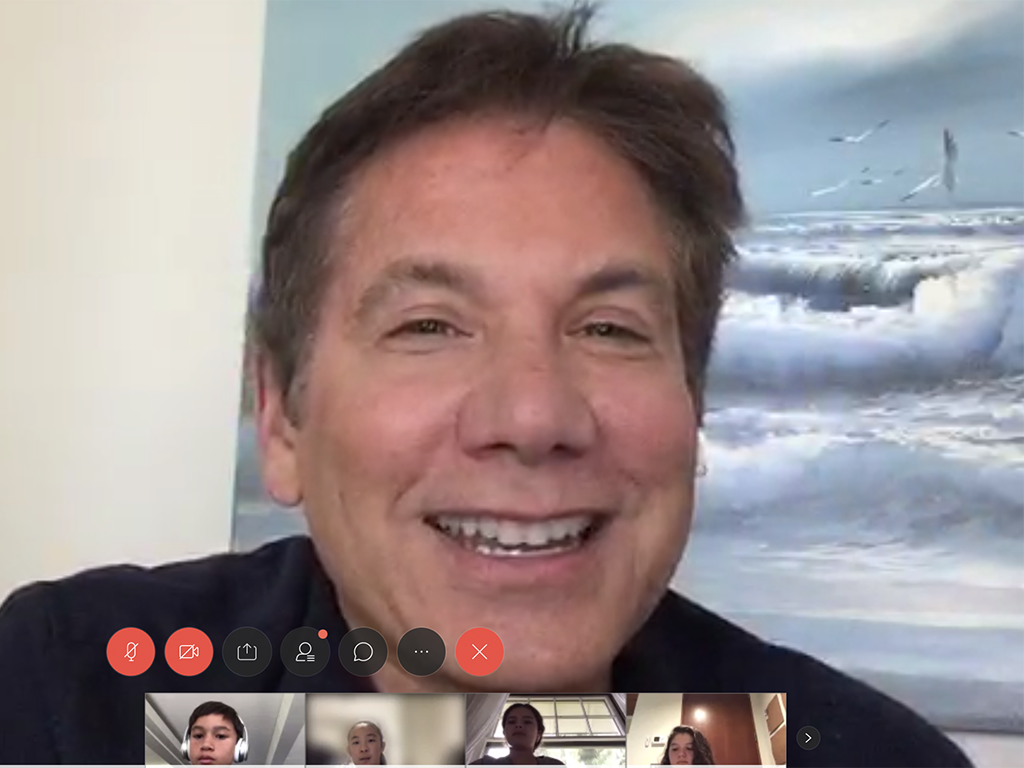
Broadway singer and actor Willy Falk ’76 joined faculty member John Roberts’ choir class Tuesday, sharing his background in music and musical theatre. During the virtual session with sixth graders, Falk, who received a Tony nomination for his performance as “Chris” in the original Broadway production of “Miss Saigon,” answered questions about his career, offering pointers for the young performers.
One of the first questions he was asked via WebEx was whether he gets nervous while performing. “Any question you may have in your mind that starts with “I” – what will people think of me, what am I doing wrong – is likely to make you nervous,” he responded. “But if you focus on what you are trying to say, you’ll feel better. And of course, prepare, prepare, prepare, rehearse, rehearse, rehearse. So when you get in front of the audience, you’ve done it a thousand times.”
Falk sang and performed in theatre throughout his time at Punahou, although in college, he received a bachelor’s degree in American and English literature and language and a minor in psychology. He also speaks four languages – French, Italian, Spanish and English. “I believe that learning about history, language, literature, and other subjects is important for the future,” he said. “It’s not about filling yourself full of knowledge and then stopping. It’s about learning how to learn throughout your life …. Like today, I’m learning about tele-teaching for the first time in my life.”
Falk moved to New York City after college to pursue his dream of a career in musical theater. Along with his leading man performance opposite Lea Salonga in the mega-hit “Miss Saigon,” he went on to perform in seven Broadway shows and many touring productions across the world, including Broadway, pop and classical concerts. Over the years, Falk has returned to Punahou on several occasions, most recently helping to coach students in the School’s spring 2017 production of “Les Misérables” and “Into the Woods” in the fall of 2018. He also has performed “If I Love Again” for Punahou Sessions and “Why God, Why” from “Miss Saigon” for the 2016 Punahou Presents, as part of the School’s 175th Celebration. At home in New York City, he also has often spoken with visiting Punahou student groups.
When asked for best performing advice, Falk told students not to get deterred if an audience isn’t responding enthusiastically. ” When you’re onstage, you don’t know what an individual audience member may be going through in their life or what sacrifices they made to come to see you,” he said. “So always try to do your best, because there is someone out there who you will touch. Always give your best performance.”
He told the story of one fan, Lori, who he met while performing on Broadway. “When ‘Miss Saigon’ opened, it was one of the hardest to get tickets on Broadway,” he said. “On the first Monday, she was there with a program for me to sign. And then she was there the next Monday and the one after that. Every Monday … She finally explained, ‘I know you think I’m crazy seeing this show every Monday, but I was diagnosed with a terminal disease and there’s no cure. For the first year I stayed in my apartment, but I realized there was something I really love – theatre. Coming to see you every week is my therapy.’ She made me realize that at every performance, there might be a Lori out there, so perform for her.”
When asked about advice for continuing to sing alone without the class experience, Falk encouraged students to take advantage of online resources. “Technology has given us tremendous advantages,” he said. “Now, you can film yourself and watch and correct yourself. The other thing that is mind-blowing is YouTube, which is the No. 1 research tool for actors and singers nowadays. You can see many other interpretations – it’s the most wonderful performance research library.”
He also shared with students a song he recorded and considers life-changing, “Whatever Time We Have,” written by Stephen Schwartz from a little known musical, “Children of Eden.” “It has a lot of meaning for our isolation right now,” Falk said. “It says, ‘I could make it on my own, but reach out – and we can make it through together.’”
